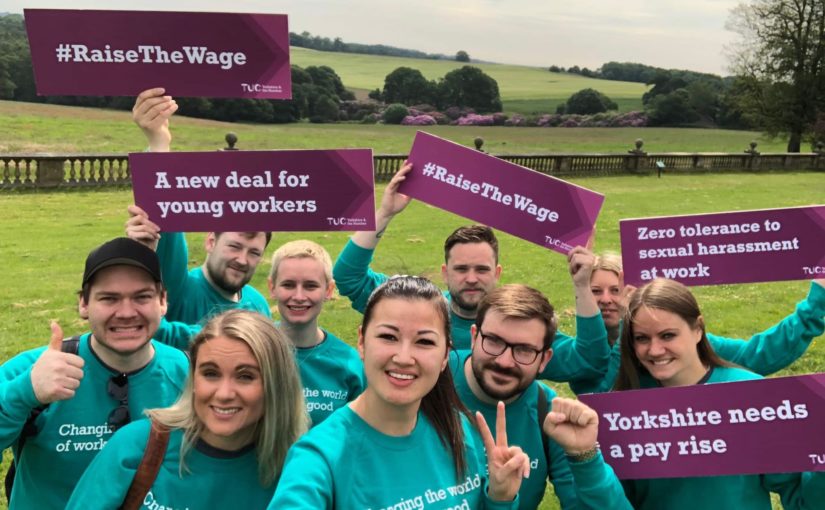The TUC Summer Patrol is an organising campaign run by young trade union unionists in the Yorkshire and the Humber region. The aim is to visit high streets to interview and engage young workers about their workplace conditions, their legal rights, and how they can organise to improve their workplace.
Summer Patrol was adapted from a Norwegian project which has taken place every summer for 34 years. Pairs of young trade unionists enter a range of workplaces unannounced in order to interview young workers about their conditions and ensure that all legal standards are being met. The Patrol acts as a positive first introduction to trade unions for many young workers, as well as a data collection exercise in order to build up an understanding of working experiences.
It also provides young trade unionists with an opportunity to work and socialise together with other young people from other unions and builds up a strong activist base. Summer Patrol also offers an opportunity to pilot new digital and tactics tools for organising and data collection, exposes activists to new techniques in campaigning and provides a testing ground for online-to-offline activist recruitment.
The Summer Patrol was developed for the UK after a delegation of Yorkshire trade unionists attended and took part in the Norwegian Summer Patrol in 2018. The introduction of GDPR legislation, which impacts the UK but not Norway due to different levels of EU engagement, was one complicating factor. The lack of a data sharing agreement between UK trade unions also presented an issue, which prevented us using the Summer Patrol as a direct recruitment exercise.
Digital technologies provided work-around solutions for these issues. One of our aims was to capture data on working conditions efficiently and store it in a GDPR compliant way. We also wanted to try to engage workers we met on the Patrol further with the labour movement.
Digital in capturing data
In Norway, the Summer Patrol interviews are conducted using paper and clipboards. At the end of each day, the data is inputted into an online form for around an hour or more. Not only did this seem inefficient, new GDPR legislation would have required our Patrol teams to take pretty severe steps to keep the data sheets secure.
Instead we used Typeform, an online survey and questionnaire building website. The TUC’s regional Policy and Campaigns Officer Gareth Lewis and GMB young activist Joe Wheatley developed our own Typeform questionnaire based off questions from the Norwegian interview form.
Questions were structured to obtain information about pay, contracted hours, breaks, tips and uniforms, camera surveillance, and other working conditions. Activists were also trained in organising or agitational conversations, which could take place around the structure of the interview. These included for example asking about age differential pay, the amount of notice workers got before shifts, or breaks.
During our Summer Patrol, every pair of canvassers used their smartphones to access the Typeform questionnaire we developed to go through the questions and input the subject’s responses. Because no data was stored on the user’s phone, the data protection implications were lessened for the volunteers.
What did we learn?
- Typeform improved the experience for activists, who didn’t have to carry piles of paper, pens, decode handwriting or enter data at a later point. They all had a mobile phone that was capable of accessing it effectively, and mobile contracts that had sufficient data to make it viable.
- Everyone who took part in the Summer Patrol agreed that entering workplaces with just our phones in hand rather than a clipboard allowed us to remain relatively inconspicuous until we decided to announce ourselves. This is particularly important when entering places like shopping centres, were trade unionists often find they are targeted by security and removed.
- Typeform also automates an email receipt to those who had been interviewed. This was handy as it allowed us to give interviewees the opportunity to unsubscribe or request data deletion at a later point (good GDPR practice), and it helped them remember they had had the conversation, so they were warmed up for the follow up when it came.
Digital to mobilise people after an initial conversation
We also used the peer to peer texting software ThruText (from the company GetThru – formerly Relay). Peer to peer texting has been used by innovative campaigners like Bernie Sanders and Alexandria Ocasio to engage with their supporters and activists.
The software allows you to distribute thousands of supporter contacts into genuine individual conversations with activists, rather than just sending simple blast texts. Customisable template responses and a clear management interface make it viable for an activist to conduct hundreds of conversations – in a way that they couldn’t do on regular phone SMS messaging.
Anecdotal evidence has suggested that text message is a preferred method of communication for young people. While phone calls are resource intensive and difficult for volunteers to handle at scale, and email campaigns are ineffective at moving people to take high-bar actions, texting has shown promising results.
Although we didn’t anticipate getting thousands of contacts through our Patrol interviews, we wanted to try and engage the people we did meet in a conversation about their working life. This was particularly important as we knew we would be unable to directly recruit workers to a union as there are many options in each sector. We also knew as young members helping to develop the TUC Summer Patrol, that the engagement we’ve had from our unions via emails has not always been good. We agreed that retaining the data and trying to develop the workers into activists under the TUC banner initially would be a positive approach.
In order to learn how to develop a ThruText campaign, Gareth, Anthony Hayes from TUC Digital, and I had a short training call with someone from the GetThru team to learn the basics. I then practiced with the system and learned the basics on building responses and contact lists.
On the last day of our Patrol, we used ThruText to send an initial message out to everyone who had offered us a phone number and permission to have follow up communications. Around half of the people we spoke to consented to giving us their number and receiving texts, so we had a list of 78 numbers.
We crafted an initial text to remind the worker about a campaign event that we’d mentioned to in our face to face conversation.
Initially we had 12 replies, 5 of which were to opt out from further texts (which the ThruText system made it easy to fulfil). 1 reply requested to be contacted by email rather than text. 6 of the respondents texted that they were interested in the event.
Considering that these texts followed a short conversation, and were asking the workers to attend a campaign meeting, which is a particularly high bar commitment, this response level was very positive.
Two weeks later, Anthony and I crafted a follow up message to remind all contacts we had left after the opt outs about our event. This follow up received 4 more responses from people who had never responded, 2 of which were people expressing interest in the event. The follow up also got further responses from others who had previously expressed interest, and allowed us to continue the conversation.
The day before the event I texted the 7 people who had expressed an interest in the event. As we had created an Eventbrite page for our event, we were able to cross-reference the sign up details with those who we were having text conversations with.
At the event itself, we had one person from the original Patrol conversations in attendance. They brought a colleague too, which brought our total number attending the meeting to 15. Considering many union meetings struggle to achieve those numbers, it was particularly exciting to see a room of trade unionists all 35 or under, with the average age probably around 23.
It was also exciting to see that respondents who had initially been interested but were subsequently unable to attend the meeting actually got in touch through ThruText to apologise and request that we retained their details to let them know about future events.
Although an invitation to an event seemed like an incredibly high bar for people that had never even heard of trade unions before, we found that by using the texting software to compliment face to face conversations, we were able to build up personal relationships with these people.
What did we learn?
- Everyone found the technology easy to use, and texting with it was simple to follow. The activity would have been more enjoyable for activists had there been more phone numbers, giving more potential conversations per activist.
- My instinct when using ThruText was to write everything fairly formally. However, we found that the more chatty and informal messages got better responses, particularly where we used the first name of the sender. The respondent who attended our event knew the sender of the texts by name, so it had clearly made an impact.
- We found it challenging to try and keep messages short, as some older phones or mobile networks can divide longer messages into multiple texts. Ultimately, we decided that this was probably likely to be rare, and that as long as the first text was under the character count it didn’t matter so much.
- It is also important to remember that links should not be sent in the first text, as some mobile networks will block these as spam. To shorten links when you do send them use URL shortening websites like bitly.
- I was also worried about hassling people and sending too many texts, particularly as we sent a couple in the week of the event itself, but as long as people have a clear opt out function it didn’t seem to be a concern for them.
Next steps?
We’ll definitely be using these digital technologies again. Typeform provided the perfect data capturing tool, and it’s really intuitive.
ThruText will also be used in future campaigns. As we continue the Summer Patrol project with ‘mini-patrols’ over the coming months, we will continue to request that the people we meet consent to receiving follow up texts. We will be using texts, alongside emails, to invite people we meet to events, which will empower them to take action in their workplaces.
There may be opportunities to increase the effectiveness of a ThurText campaign. A more conversational opening message may have raised response rates. And a lower bar first ask may have also increased the number getting involved.
By exposing activists to digital campaigning techniques, we hope to train them to become “digital champions” within their own unions and branches. By providing the technology, training and framework to implement these techniques, we hope they consider them in their own campaigns or union organising.
Indeed, some of the young trade unionists taking part in the Patrol have already taken ideas from this project to use in their own respective unions. In my own union, we hope to use the software or something similar to contact our young members, to send out surveys (most likely built using Typeform) and invitations to meetings and campaign activity.
Written by Caty Murray, GMB Young Member activist in Sheffield

